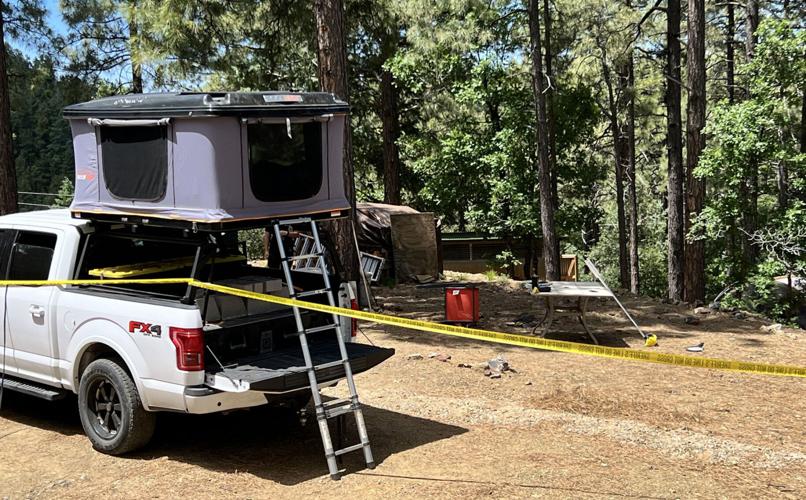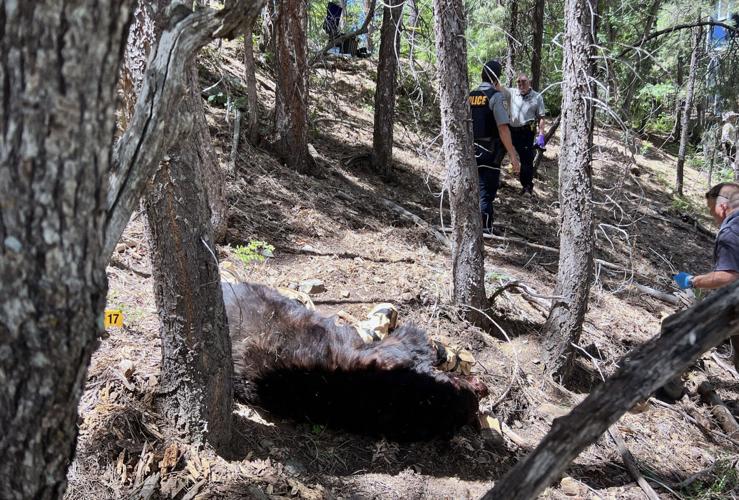Steven Jackson was doing what so many Tucsonans do this time of year: Retreating from the heat to the mountains.
Thousands of us do it every summer — going to cabins or camping under the trees. When we go, we know these journeys come with risks, mostly minor: A vehicular accident is probably the biggest one.
Once you arrive in the woods and the cooler air, a snake bite or a bad fall are some other real risks. They don’t usually happen, but they’re not that uncommon.
If you go down the list of risks — bee swarm, poison ivy and oak, lightning strike — being attacked by a predator animal is way down toward the bottom. It rarely happens.
That’s one of the reasons the bear attack that killed Jackson, who lived in Armory Park, is so shocking. Jackson, 66, was camped at a property he owned in the Groom Creek area south of Prescott. The bear apparently surprised Jackson, attacking him from behind while he was drinking coffee at a table on his property.
It seems to have been a predatory act. The bear did not have rabies or any other known predisposition toward attacking.
It’s enough to make many people think twice about whether and how they go out in the wilds of Arizona. So far, it appears Jackson was simply incredibly unlucky and happened to be victimized in a rare incident that was also typical of fatal black-bear attacks.
‘He played a big part in my life’
Originally from Michigan, Jackson moved to Bisbee after college, according to his family’s obituary. While in Cochise County, he helped start an alternative school in Douglas, then eventually moved to Tucson.
Here, he was best known as a youth soccer coach. He coached the Sabino High School girls’ soccer team, spent years with Tucson Soccer Academy and was director of coaching at FC Sonora soccer club. There, he got to be good friends with fellow coach Chris Cox, who called him “a great student and teacher of the game, grabbing techniques and tactics from around the world.”
“One of his greatest accomplishments was the ‘98 boys. A lot of kids from various backgrounds who he brought together,” Cox said.
Against the odds, a combination of rec-league friends, refugee players and others became one of the state’s top teams, said Gabriel Wilhelm, who was one of the players.
“As a coach, he took our team, a group of friends playing at a pretty low level, and took us up to the top level in the state,” Wilhelm said. “He played a big part in my life and all the boys’ lives that were on that team.”
Attack was an ‘anomaly’
Jackson, who worked in IT for Caliber Home Loans, retired from work and from his soccer coaching in recent years, Cox said. During summers, he liked to visit his family in northern Michigan, where he had helped build a cabin.
Charlie Kendrick, a fellow former soccer coach and Caliber colleague, said "They broke the mold when they made Steve."
"Among his interests and experiences were: constantly running projects at his homes in Michigan, in Tucson and the cabin he was building in Prescott (he said he never lived in a completely finished home in his life), coaching multiple sports, dance, a PE coach at the U of A, a Pilates instructor, opening a technology school in Douglas (I believe), teaching English in Durango, MX and so much more."
Increasingly, Cox said, Jackson spent summer weeks working on his planned retirement home in the Groom Creek area, which is at an elevation between 5,000 and 6,000 feet.
“He was going to put solar up and water collection and the whole works,” Cox said. “He had a garage or work area already built. He would go up there for a month or more, then at the end of the summer usually went up again.”
During this trip, Jackson was sleeping in a tent mounted on a frame over his pickup bed. The campsite was neat and gave no indication of anything that Jackson might have done to attract the bear, said Mark Hart, an Arizona Game and Fish spokesman.
“We wish all campsites were that neat,” said Hart, who visited the site of the attack after it happened Friday morning. He called the incident an “anomaly.”
“Usually there’s a run-up of behavior that ends in an attack. It always involves losing their fear of humans,” Hart said. “Last time we had a fatal bear attack, it was in Pinetop. A woman startled a black bear dumpster-diving.”
Attacks on rise, but still rare
Over the long term and the breadth of the continent, though, the attack appears somewhat typical of fatal black-bear attacks. Stephen Herrero, a retired professor of ecology at the University of Calgary, researched extensively bear attacks in North America and found that they have been increasing gradually, close to the same pace as human population increase.
Bears that make a lot of noise and display aggression by huffing or pounding the ground usually are not the attackers who kill, he said in an interview with the New York Times. Neither are mother bears with cubs.
“The bears that occasionally kill people are the ones who do it very stealthily, much like you would expect a predator to do,” he said. “They get close to a person and then they charge, usually without making any noise. Of course most people haven’t seen this kind of behavior because it’s very rare.”
Victims are usually either alone or with just one other person, Herrero said. In these senses, the attack on Jackson was typical of fatal bear attacks. The only big difference is that these fatal attacks are more typical in Canada or Alaska than the lower 48 states.
If a black bear sneaks up and attacks undetected, there is little anyone can do but fight. And Jackson did fight, Hart said. But you can’t shoot or deploy bear spray against a bear you don’t even know is there.
The good news is, the usual things almost always work: You lock away food, keep a neat camp, and if you see a bear, stand tall with others, make a lot of noise, and, if the bear approaches, back up slowly while getting ready to spray. Bear spray, by the way, must be deployed toward the bear’s feet so it wafts up to its nostrils.
Bear attacks like this are incredibly rare and shouldn’t be cause for people to start shooting at animals that aren’t posing an imminent threat — that’s illegal, unnecessary and wrong, as the Yavapai County Sheriff’s Office warned. It’s still more likely you’ll die from a vehicle accident or even a lightning strike when you head out to the cool air under the trees.
One good Tucson man’s incredibly bad luck doesn’t change that.
Get your morning recap of today's local news and read the full stories here: http://tucne.ws/morning





